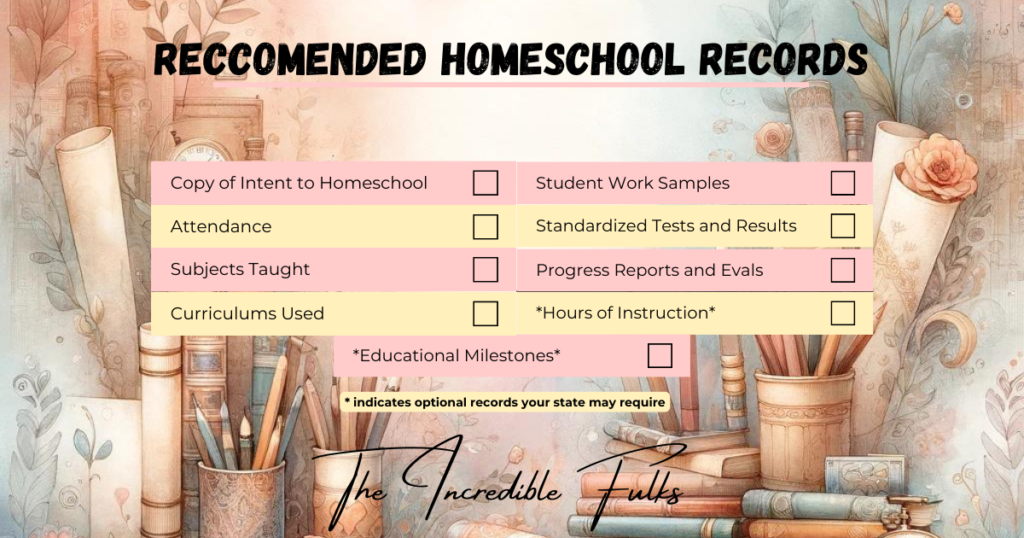Welcome back to our How to Start Homeschooling series where I am helping you get started homeschooling successfully! This is part 6 where I will cover how to keep records to comply with state regulations, and for your own benefit. I'll also get into why it is so important to keep certain extra records. Record keeping, along with organization is half the battle of homeschooling, so lets get into this together!
If you haven't read the first 5 articles in this series, be sure to check out the “How to Start Homeschooling” page. You can also just jump back to Part 1!
Record Keeping Basics
Almost every state has some sort of record requirement. It can be as simple as a written letter saying you're going to homeschool your child, or as detailed as a breakdown of what curriculum you're using and how many hours a day you had school. At a minimum, your records should include attendance, a list of the subjects taught along with curriculum used, samples of your child's work, any standardized tests taken and their results, and progress reports or evaluations. Depending on your state’s laws, you might also need to keep track of hours of instruction, and educational milestones.

There are many different ways to keep records. You can keep paper records, you can digitalize it, or you can use a record keeping app or software. Our family uses CamScanner and Homeschool Planet to stay paper free and keep records all together in one program.
Simple Templates and Examples
To get you started, I'll provide some simple templates that you can easily customized for your needs. These include:
- Attendance Sheets: Track daily or yearly attendance with a straightforward calendar.
- Progress Reports: Summarize achievements and areas for growth each quarter.
- Lesson Logs: Keep a daily or weekly log of subjects covered and materials used.
- Portfolio Samples: Create a binder that showcases samples of your child’s best work throughout the year.
Here is product I made just for this.

Homeschool Record Keeping Templates
Embark on a beautifully organized homeschooling journey with our Elegant Homeschool Record Keeper, adorned with serene watercolor flower backgrounds. Designed with both the diligent educator and creative student in mind, this comprehensive digital kit contains 11 carefully crafted pages to document and celebrate the educational achievements of the year.
The Importance of Record Keeping
Record keeping in homeschooling is not just a legal requirement in many states. It’s a practical tool for tracking your child’s progress, identifying strengths and areas for improvement, and planning future educational strategies. Well-kept records provide tangible proof of your child’s educational journey. This can be essential for college applications, transferring to traditional schools, or simply for your own peace of mind. Here are 8 benefits to keeping records in your homeschool.
- Ensures Accountability: Maintains a clear record of educational activities, helping parents ensure they meet state educational standards and personal teaching objectives.
- Facilitates Academic Assessment: Allows for the regular assessment of a student's understanding and mastery of the material, which can guide instructional decisions and curriculum adjustments.
- Simplifies Reporting: Makes it easier to prepare annual education reports for state departments or umbrella schools, with all necessary information systematically organized.
- Aids in Curriculum Planning: Provides historical data on which curricula and teaching methods have been most effective, informing future curriculum choices and teaching strategies.
- Validates the Homeschooling Process: Gives concrete evidence of the homeschooling process and progress, which can be particularly useful in discussions with skeptical family members or educational authorities.
- Enhances Student Self-Awareness: Helps students become more aware of their learning journey, encouraging self-reflection and goal setting for their educational growth.
- Supports Transcripts and Diplomas: Essential for creating official transcripts and diplomas that may be required for college applications, scholarship opportunities, or job applications.
- Prepares for Unexpected Changes: In the event of unforeseen circumstances that might require a shift in the educational setting, well-kept records ensure a smooth transition for the student.
Comprehensive Record-Keeping Strategies in Our Course
For those who want to dive deeper, our course offers a robust guide to record keeping. We’ll take you through advanced strategies for documenting your child’s educational development, including digital tools and software designed for homeschoolers. You’ll learn how to create a comprehensive homeschooling portfolio that not only satisfies the state, but your peace of mind too.
Conclusion Effective record keeping is the unsung hero of successful homeschooling. It doesn’t have to be a chore. With the right tools and systems in place, it can be seamlessly integrated into your daily routine. Join us in our next article, where we’ll explore how to organize your homeschool schedule and materials.
Read part 7 now! Effective homeschool planning
Be sure to follow me to stay up to date on this series!





